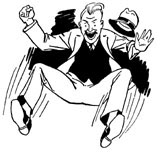
Controlling the Passions: A Psychiatrist’s Perspective
TWO GREAT TRUTHS ABOUT HUMAN NATURE
The Judeo-Christian assessment of human nature is not a positive one. The Hebrew Bible reads, “The heart is deceitful above all things, and desperately corrupt; who can understand it?” (Jer. 17:9), and the New Testament says, “From within, out of the heart of man, come evil thoughts, fornication, theft, murder, adultery, coveting, wickedness, deceit, licentiousness, envy, slander, pride, foolishness” (Mk. 7:21). And in his Letter to the Romans, St. Paul writes that “all have sinned and fall short of the glory of God” (3:23).
Sigmund Freud recognized the instinctual drives of aggression and sexuality as the core of our humanity. He saw both as the psychic forces that motivate and energize human behavior, as well as the wellspring of the darkest and most sinister aspects of human nature. To his friend, the Swiss pastor Oskar Pfister, he wrote that he didn’t see much good in people, whether or not they subscribed to an ethical doctrine. And of his own psychoanalytic method, Freud’s modest claim (unlike the claims of some of his followers) was that the most it could accomplish would be to turn neurotic misery into ordinary human unhappiness.
Substitute Freud’s “id” for the biblical use of “heart” as the metaphorical repository of the psychic forces that drive human desires and behavior and you have similar views of human nature. The catalog of sins in Mark’s Gospel is illustrative of unbridled expressions of the id’s aggressive and sexual drives.
That aggression and sexuality are basic human drives requires no theoretical justification, nor does the notion that their expression, control, and regulation are intensely problematic, both collectively and individually. Human history is a chronicle of war between states and nations, and conflicts regarding sexuality and its expression have perpetually roiled human society, not least that of contemporary America. Every psychiatrist can testify that helping people deal with their anger and sexuality is a major focus in psychotherapy. Whatever the taint in human nature — called Original Sin in the Christian narrative or Eros vs. Thanatos in the psychoanalytic — controlling the forces of aggression and sexuality is a defining feature of the human experience. In fact, the degree to which these drives are mastered determines the maturity of individuals and the success of groups, from the familial to the national. When asked to define “normality,” Freud was reputed to reply, “The ability to work and to love,” that is, the highest — or, in his terms, “sublimated” — expression of aggression and sexuality, respectively.
You May Also Enjoy
The complete idiot's guide to misunderstanding Catholicism
There's a lot of debate about the music in Catholic parishes, including the words of hymns.
Cover Girl... Hello, Dolly... A Pound of Flesh... For the Love of Meat... Akron Stack Hack... Math: For Mature Audiences Only... Too Cruel for School?... Captain California... Swiss Dismissal... and more

